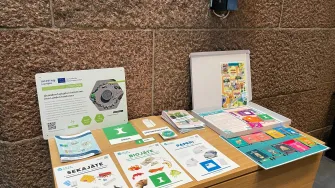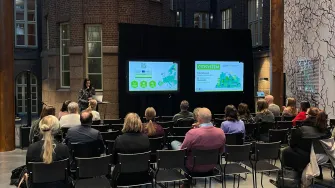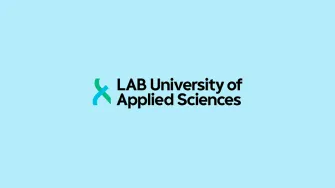CITISYSTEM - Supporting cities in sustainable biobased systemic change
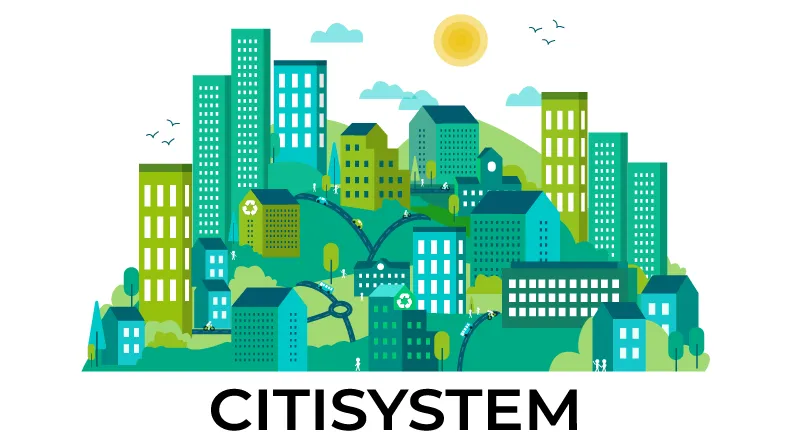
Biobased material is one of the largest material flows in European cities. A central concern is how to utilise this in a circular way.
According to the waste hierarchy, after prevention; re-use, recycling, and energy use are the preferred options, however, still, a large amount of biowaste is disposed. Valuable resources for both material and energy, as well as, nutrition are lost through under-utilisation of bioresources, e.g., biowaste disposed in the mixed municipal waste. The importance of supporting the utilisation and circulation of biobased materials in nutrient and energy loops are more important than ever.
Biowaste has a high potential for contributing to circularity, delivering valuable soil-improving materials, utilised as fertiliser, and transferred into a biogas. With a share of 34%, biowaste is the largest single component of municipal waste in the EU. Recycling of biowaste is key to meeting the EU target to recycle 65% of municipal waste by 2035.
CITISYSTEM project's partners involved, share the desire to develop biobased circular economy on systemic and stakeholder levels in cities.
Systemic solutions include effective and innovative ways to organise the policies to support circular biobased economy, circulation of bioresources, biowaste collection and biowaste processing.
OBJECTIVES:
The purpose of the CITISYSTEM project is to support cities in promoting the biobased circular economy. The focus is to increase specific city-level actions and to involve the community to understand the importance of biomass nutrient and energy flows. Achieving such a goal, requires a focus on system-level and community/stakeholder-level changes.
The sub-goals that support the overall goal are:
1) Creating system-level biobased circular economy solutions, e.g. organising separate collections of biowaste, supporting the innovative utilisation of biowaste in products, and supporting the production process of biogas and compost to promote local energy production and nutrient cycles.
2) Increasing the awareness and understanding amongst communities and stakeholders about the importance of the regional biobased circular economy, e.g. the full utilisation of regional biomass resources.
LAB University of Applied Sciences is the lead partner of the project, collaborating with the city of Lahti (Finland), Technical University of Košice (Slovakia), BSC, Business support centre L.t.d., Kranj (Slovenia), City of Mechelen (Belgium), Regional Development Fund of Central Macedonia (Greece), and CERCA Institute-Catalan Research Centres Institute (Spain, until 31.8.2024) and IRTA Institute - Catalan Institute of Agrifood Research and Technology (Spain, starting from 1.9.2024).
The total budget of the EU Interreg Europe funded project is 1,521,696.00€. The project lasts for four years (implementation 2023–2026 and follow-up 2026–2027).
According to the waste hierarchy, after prevention; re-use, recycling, and energy use are the preferred options, however, still, a large amount of biowaste is disposed. Valuable resources for both material and energy, as well as, nutrition are lost through under-utilisation of bioresources, e.g., biowaste disposed in the mixed municipal waste. The importance of supporting the utilisation and circulation of biobased materials in nutrient and energy loops are more important than ever.
Biowaste has a high potential for contributing to circularity, delivering valuable soil-improving materials, utilised as fertiliser, and transferred into a biogas. With a share of 34%, biowaste is the largest single component of municipal waste in the EU. Recycling of biowaste is key to meeting the EU target to recycle 65% of municipal waste by 2035.
CITISYSTEM project's partners involved, share the desire to develop biobased circular economy on systemic and stakeholder levels in cities.
Systemic solutions include effective and innovative ways to organise the policies to support circular biobased economy, circulation of bioresources, biowaste collection and biowaste processing.
OBJECTIVES:
The purpose of the CITISYSTEM project is to support cities in promoting the biobased circular economy. The focus is to increase specific city-level actions and to involve the community to understand the importance of biomass nutrient and energy flows. Achieving such a goal, requires a focus on system-level and community/stakeholder-level changes.
The sub-goals that support the overall goal are:
1) Creating system-level biobased circular economy solutions, e.g. organising separate collections of biowaste, supporting the innovative utilisation of biowaste in products, and supporting the production process of biogas and compost to promote local energy production and nutrient cycles.
2) Increasing the awareness and understanding amongst communities and stakeholders about the importance of the regional biobased circular economy, e.g. the full utilisation of regional biomass resources.
LAB University of Applied Sciences is the lead partner of the project, collaborating with the city of Lahti (Finland), Technical University of Košice (Slovakia), BSC, Business support centre L.t.d., Kranj (Slovenia), City of Mechelen (Belgium), Regional Development Fund of Central Macedonia (Greece), and CERCA Institute-Catalan Research Centres Institute (Spain, until 31.8.2024) and IRTA Institute - Catalan Institute of Agrifood Research and Technology (Spain, starting from 1.9.2024).
The total budget of the EU Interreg Europe funded project is 1,521,696.00€. The project lasts for four years (implementation 2023–2026 and follow-up 2026–2027).
Project period
-
Project state
On-going
Project area
International
Project funding
Interreg Europe 2021-2027
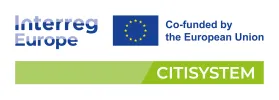
Read more about the project
LAB role
Lead partner
Unit
Technology
Project focus area
Multipurpose materials





